
It’s gratifying to be proved right, though rather less gratifying when it’s on such a fundamental subject as Britain in the EU.
Since I posted yesterday, David Cameron has been put in a very invidious position by the ex-Tory Shadow Home Secretary David Davis. Davis has, in effect, issued a direct challenge to Cameron’s authority on Conservative policy towards Europe.
Writing here in the Daily Mail, Mr. Davis has called on the Tory leader to offer the public a referendum on the future of Britain’s relationship with the EU. Davis’s challenge is, of course, a direct result of yesterday’s announcement that Cameron has abandoned his “cast iron” pledge that the Tories would hold a referendum on the Lisbon Treaty.
Cameron and the Tories have consistently and constantly argued that the Labour Government should have held a referendum on Lisbon. What price honesty now, Mr. Cameron?
As we all know, the Conservatives made their U-turn after the Czech government caved in and signed up to the Treaty yesterday, removing the final obstacle to its ratification. I would have thought Cameron and co might have anticipated this happening and made their policy accordingly.
For David Davis all seems startlingly clear. He proclaims today:
“What we should do is, in my view, clear. We should have a referendum, not on the treaty, but on the negotiating mandate that the British Government takes to the European Union.
“The question should contain four or five specific strategic aims which clearly summarise our objectives.
“The sort of things we might include are: recovering control over our criminal justice, asylum and immigration policies; a robust opt-out of the European Charter of Fundamental Rights; serious exemptions to the seemingly endless flood of European regulations which cost the UK economy billions of pounds each year; a recovery of our rights to negotiate on trade; exemption from European interference into trade in services and foreign direct investment rules; and an exemption from any restrictions on our foreign policy.
“The referendum should be the first piece of legislation in the new parliament, and should be held within three months of the election.
“Some fear this would become an ‘in or out’ referendum, a decision on whether to continue our membership of the European Union. It would be nothing of the sort. Killing this tired old canard is one of the reasons the referendum question has to be absolutely clear in language and intent.
“Of course it is possible that we will not achieve every change we want.
If that is the outcome, we should give the British people the right to accept or reject it in a further referendum.”
So that’s all right then Mr. D. Hold a referendum which will have no status whatsoever with the EU Council of Ministers, the European Commission or even the European Parliament and then seek to impose Tory Party prejudices on the EU as a whole. Wow, that’s one hell of a policy. I’m glad you believe it Mr. Davis because I can assure you no-one in the EU will give it even the smallest chink of the light of day, your referendum notwithstanding.
This David Davis nonsense only serves to highlight Tory wrong headedness on Europe. The Davis faction, which to an outside observer seems to be the Tory grassroots, most Conservative MPs and the majority of the Shadow Cabinet, are quite honestly living in la la land. It will simply not be possible to do what they want. It is not a credible policy.
Since the Lisbon Treaty for the first time allows existing EU member states to withdraw from the European Union, the only referendum which makes any sense at all is the one on whether the UK remains in the EU or comes out.
David Davis in his article rejects such a referendum on EU membership, presumably because he thinks the he and the anti-Europeans would lose.
The views of the Tory Party, as opposed to those of David Cameron, on Europe obviously remain confused to put it mildly. It will be interesting to see whether my hunch that Cameron will go with his Party turns out to be correct.
 Last week the coalition government’s Europe Bill was voted through the first stage of the parliamentary process. The bill is the result of Cameron’s promise to the eurosceptic wing of his party to hold a referendum in the instance of any further treaty changes and to ‘enshrine the primacy of parliamentary sovereignty’.
Last week the coalition government’s Europe Bill was voted through the first stage of the parliamentary process. The bill is the result of Cameron’s promise to the eurosceptic wing of his party to hold a referendum in the instance of any further treaty changes and to ‘enshrine the primacy of parliamentary sovereignty’.


